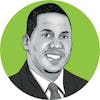 See
more of the story
See
more of the story
When I would go to my grandmama's house as a child, I would always smell something simmering on the stove. Her kitchen was my favorite restaurant.
Before you could get comfortable, however, she would always ask the same question:
"Did you eat?"
She had grown up in poverty in Mississippi and lived with the presence of hunger in her family and community. She did not want her grandchildren to feel that pain.
Food scarcity has become more prevalent in the pandemic.More people have dealt with the shame that hunger can create. On this Thanksgiving, I wonder if we can do more to make "Did you eat?" an expression of care and concern and not one of judgment.
My grandmama asked that question with love.
"One of the most powerful things we can do is make it OK to ask for help," said Allison O'Toole, CEO of Second Harvest Heartland. "It shows trust in your community when you do that, and I think talking about it with friends and family and neighbors helps open that conversation up. Sometimes, it's merely connecting someone or offering resources."
It all happened so fast for Sheyla Crawford, who is from Brazil, and Aaron Crawford, a California native, last year as COVID-19 had a direct impact on their family.
A medical procedure limited Sheyla's mobility and interrupted her work at a child-care facility. Then, Aaron lost his job, a victim of budget cuts in the pandemic.
There were medical bills and the costs attached to raising three children.
A leak in the Apple Valley family's financial faucet had become a deluge. They knew they needed help. They turned to a local food shelf.
"It touches very deep and it's very emotional for me because I'm from a Third World country," Sheyla said. "You see kids on the street asking for a quarter to go get whatever they can get, so it was a very sad reality we lived in, and to be able to be here in a country where you have access to help, somebody who can just come to us and say, 'We can help you,' it's a lot. That's so great to have and I'm always thankful for the help."
The pandemic has changed the face of hunger — at the least the face that exists within our stereotypes. The Crawfords represent a new normal in America: people who had not previously needed assistance turning to food shelves and other outlets to fill their refrigerators.
Per a Star Tribune story last week, Minnesota's food shelves are projected to end this year with 3.7 million visits, just short of last year's record number of 3.8 million. Hunger is closer than perhaps many of us had imagined before all this. It's in our families and our social circles. It's in the cubicle next to us at work. It's at our neighbor's house. And it is silent.
We can't see it.
Aaron Crawford could feel it, though.
He and Sheyla met on a bus trip from Los Angeles to Las Vegas. He saw her engaged in a conversation with another person and during a brief stop on the trip, he switched seats to get closer to her.
They got married a few months later.
When they first sought help from a food shelf last year, Aaron refused to go. He was prideful and he'd never had to ask for help.
"I struggled with it," said Aaron, a Navy veteran. "I was embarrassed. I was thinking, 'Oh, my lord, I'm coming to this point. What the heck is going on with my life?' It just felt like I couldn't crawl back up."
I wonder if there are people in my world, in my life, who perhaps do not feel comfortable enough to discuss their needs. I wonder if I'm doing enough to minimize that shame so many families facing food scarcity might feel right now.
At my youngest daughter's school, there is a food shelf every week. I've watched that line grow over the last year. It is diverse. There are people in used cars and people in newer cars. There are people who walk there with shopping carts and there are families who patiently wait for the staffers to load their vehicles.
Sheyla would sit in those lines, too. And they gave her family a lifeline.
Over the next year, life improved for the Crawfords. She picked up hours at her child-care job and Aaron found a gig with UPS. They are not where they were, but they're moving forward.
"We're eking by," Aaron said. "We go to the food shelf to help out that little bit extra. Hopefully, six months to a year, we can be in our own house and we can start saving some more money instead of putting it all off to rent. We can have something that's ours and we'll be able to not even have to go to the food shelf anymore. We'll go to volunteer and give back what they gave us."
At this Thanksgiving, many of us will enjoy an infinite menu. We won't have to think much about hunger.
On Friday and the days that follow, however, many will return to the same challenges they've encountered over the last year.
That's when I'll remember my grandmama's loving words.
"Did you eat?" could help someone in our lives more than we might know.






